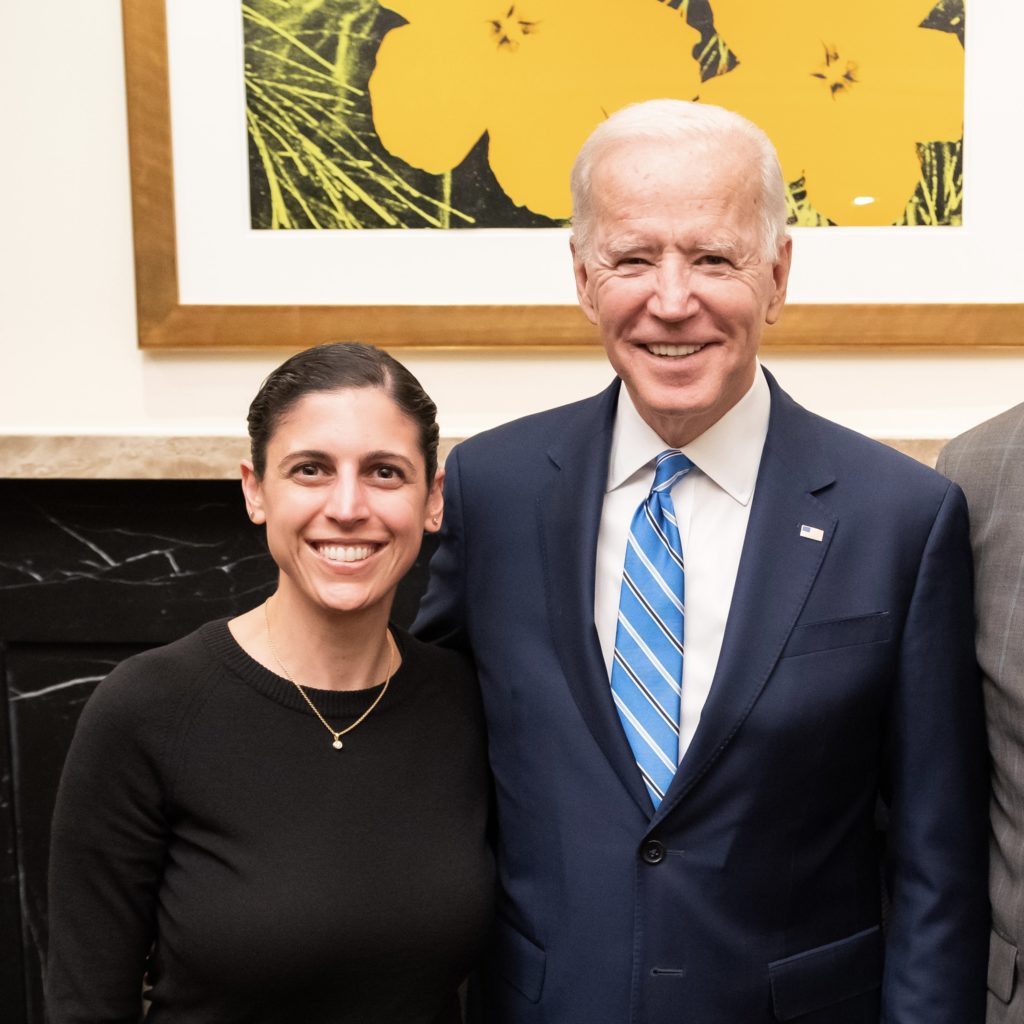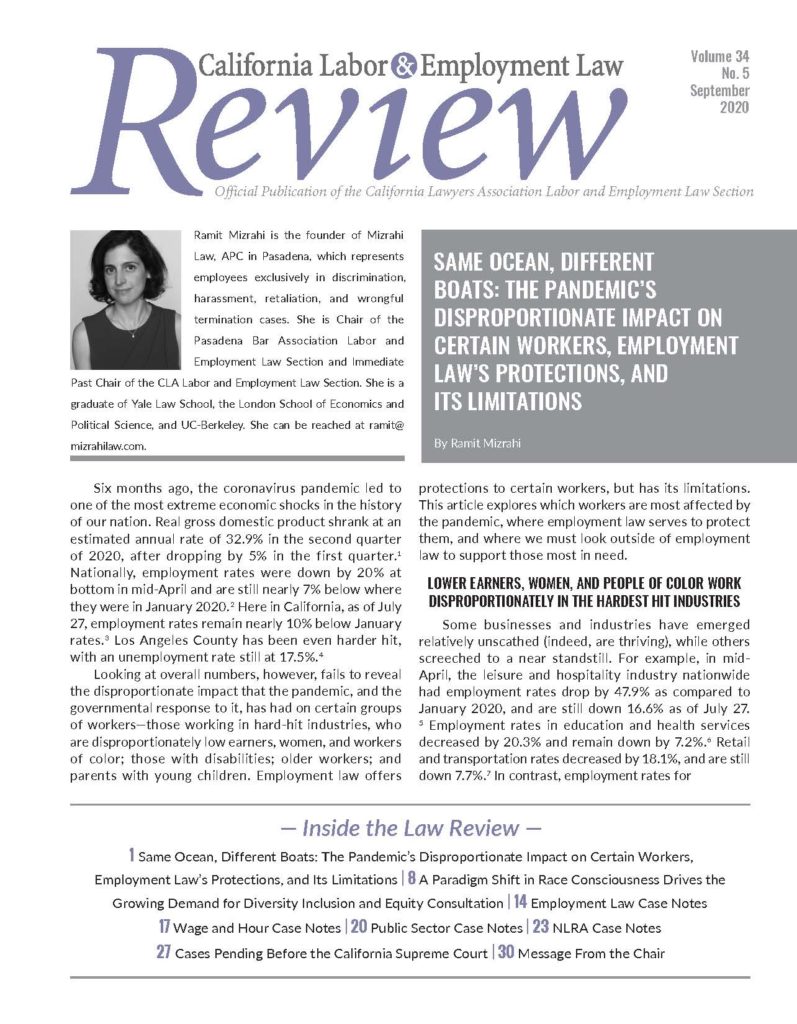-
15 Oct '21

With a Democratic supermajority in the California legislature and a Democratic governor (who survived a recall election), 2021 brings another slew of employment law bills that expand employee protections.
DISCRIMINATION AND HARASSMENT
SB 331 – “Silenced No More” Act – Non-Disclosure Agreements
The most important bill from this legislative session is SB 331, also known as the Silenced No More Act. SB 331 expands the protections created in 2018 by the Stand Together Against Non-Disclosures (STAND) Act (SB-820) and omnibus sexual harassment bill SB 1300. Those bills targeted attempts by employers to silence employees who have been sexually harassed or subjected to discrimination or retaliation based on sex. SB 331 ensure that these same protections apply to all employees subjected to discrimination, harassment and retaliation. It expands protections to claims based on all protected categories covered by the Fair Employment and Housing Act (FEHA), including race, religion, disability, age, veteran status, etc.
The STAND Act added Code of Civil Procedure Section 1001. Section 1001 prohibits confidentiality provisions in settlement agreements involving civil or administrative actions that state a cause of action for: sexual assault; workplace harassment or discrimination based on sex; failure to prevent workplace harassment or discrimination based on sex; sexual harassment in a business, service, or professional relationship; and sex discrimination, harassment, or retaliation by the owner of a housing accommodation.
SB 331 amends C.C.P. § 1001 to expand the prohibition on non-disclosure agreements to encompass claims of discrimination, harassment, or retaliation based on any protected category covered by the FEHA (not just those based on sex). This expanded prohibition applies to agreements entered into on or after January 1, 2022. SB 331 clarifies that C.C.P. § 1001 prohibits provisions that prevent or restrict the disclosure of such information.
SB 1300 had added Government Code § 12964.5, which made it unlawful for an employer, in exchange for a raise or bonus, or as a condition of employment or continuing employment, to: (1) require employees to sign a release of claim or right under the FEHA, or (2) to require employees to sign a nondisparagement agreement that gags employees from disclosing information about sexual harassment and other unlawful acts.
SB 331 amends Government Code § 12964.5 as follows:
-
12 Oct '21
After years of advocacy to raise the minimum wage, all California workers can look forward to a $15 an hour minimum wage by January 1, 2023.
While the federal minimum wage of $7.25 per hour has not changed in over a decade, states, counties, and cities all have the ability to set a minimum wage. Below, we summarize the minimum wages set by the State of California, Los Angeles City and County, and other cities within Los Angeles County. Employees are entitled to the highest applicable minimum wage.
State of California
California State Minimum Wage Effective Date Large Employers (26+ Employees) Small Employers (≤25 Employees) 1/1/2022 $15 per hour $14 per hour 1/1/2023 $15 per hour $15 per hour The State minimum wage will rise $1 per hour on January 1 of each year until it reaches $15 per hour for both small and large employers in 2023. Further details (including regarding the rare exceptions) can be found on the Labor Commissioner’s website.
City of Los Angeles and Unincorporated Areas of Los Angeles County
Los Angeles City and County Minimum Wage Rates Locality Minimum Wage (As of July 1, 2022) Unincorporated Los Angeles County $15.96 per hour Los Angeles City $16.04 per hour Pasadena $16.11 per hour Santa Monica $15.96 per hour ($18.17 for hotels) West Hollywood $16.50 per hour for large businesses, $16.00 per hour for small businesses, $18.35 per hour for hotel employers Malibu $15.96 per hour Long Beach $15 per hour for large employers, $14 per hour for small employers, different rates for hotel and concessionaire workers Cities Without Specified Minimum Wage Track State minimum wage -
19 Mar '21

The pandemic continues to take its greatest toll on the most vulnerable among us. It has widened existing inequalities, including with respect to wealth, race, and gender. Indeed, while those who lost their jobs are struggling to make ends meet, many others are seeing their bank and investment accounts swell. American household wealth hit a record high at the end of 2020!
A newly-released report from the California Policy Lab, covered by the New York Times, contains shocking statistics that show just how unequal the pandemic has been in its impact on California workers. The data show that, since the start of the pandemic, about 47% of California workers have applied for unemployment insurance (regular unemployment insurance and pandemic unemployment assistance). However, the most vulnerable workers have borne the brunt of this unemployment.
As I have written previously, the pandemic has had a disproportionate impact on low-wage workers, women, and people of color. The California Policy Lab report explores these inequities in depth, looking at the impact by race/ethnicity, gender, age, educational attainment, and industry. To give some examples:
- About 90% of Black workers have filed for unemployment insurance benefits, as compared to about 41% of white workers.
- Women have applied for unemployment insurance at a rate 6% higher than men (51% vs. 45%).
- Workers with high school educations (or less) were nearly four times more likely to received benefits following the December extensions (55% vs. 14%).
- Workers between the ages of 16 and 23 were particularly hard hit, with about 69% filing for unemployment insurance benefits, as compared to 40-48% of those in the other age demographics.
As of February 2021, nearly 20% of California workers are still receiving unemployment benefits, a rate that is 50% higher than the peak during the Great Recession; they are now “long-term unemployed.”
While we may be seeing the light at the end of the tunnel with the pandemic, our economy and unemployment levels have a long way to improve.
-
22 Jan '21

On January 20, millions of Americans rejoiced as our new President and Vice President were sworn in. Women and girls wore Chucks and pearls to honor Kamala Harris and to celebrate her many firsts as Vice President—first woman, first Black American, and first of South Asian descent. We shed tears of joy, heaved sighs of relief, and felt hope for a better tomorrow.
President Biden delivered a powerful message of hope, unity, healing, and rebuilding. He promised an administration that would dedicate itself to fighting the pandemic, delivering jobs, addressing growing inequality, rebuilding the middle class, securing healthcare, seeking racial justice, returning to truth and transparency, and fighting hatred and divisions.
National Youth Poet Laureate Amanda Gorman captured the moment with her breathtaking poem, The Hill We Climb, which ended:
The new dawn blooms as we free it
For there is always light,
if only we’re brave enough to see it
If only we’re brave enough to be itAfter the inauguration, the President got to work, signing 15 executive orders on his first day in office. More have followed. Already, we see that this new administration, with the backing of the Senate and the House of Representatives, will implement sweeping changes to benefit workers throughout the country.
Here are some of the changes we can expect:
-
04 Oct '20

2020 has turned out to be another bumper year for employment legislation. The pandemic provided the impetus for the California legislature to expand family and medical leave to employees at smaller companies, fill in gaps with respect to supplemental paid sick leave, and enact a number of measures aimed at keeping employees safer at work. The California legislature also provided greater whistleblower protections, expanded employer reporting obligations, clarified the law with respect to employee misclassification, and expanded the Labor Commissioner’s powers. Below, we cover the top employment laws that were signed into law or vetoed this legislative session.
-
The September 2020 issue of the California Labor & Employment Law Review features Ramit Mizrahi’s article, titled “Same Ocean, Different Boats: The Pandemic’s Disproportionate Impact on Certain Workers, Employment Law’s Protections, and Its Limitations.” The article explores which workers have been most affected by the pandemic, where employment law serves to protect them, and where we must look outside of employment law to support those most in need.
Click on the below image to read the article in full.
-

UPDATE: On March 19, 2021, SB 95 was signed into law, which provided COVID-19 supplemental paid sick leave (SPSL) for certain covered employees who were unable to work due to COVID-19, including due to quarantine requirements. SB 95 was applied retroactively to January 1, 2021 and was in place until September 30, 2021.
Last week, on September 9, Governor Newsom signed AB-1867 into law. AB-1867, effective immediately, makes sure that all California employees are eligible for COVID-19-related supplemental paid sick leave (“SPSL”) by filling in the gaps lefts by the federal Families First Coronavirus Response Act (“FFCRA”). The FFCRA provides for 2 weeks of COVID-19-related paid sick leave for eligible employees. However, it only applies to employers with fewer than 500 employees. It further allows employers of certain health care providers or emergency responders to elect to exempt them from FFCRA protections. In fact, it is estimated that the FFCRA leaves out up to 80% of the workforce.
-

On September 25, 2020, Ramit Mizrahi will be speaking about recent California employment law legislation at the California Lawyers Association’s 2020 Virtual Annual Meeting.
Here are the details:
California Employment Law Legislative Update
Description: From a sea change in the legality of contract labor requirements to special issues around remote working and the need for workplace safety in the COVID-19 pandemic, 2020 has shaped up to be an exciting year for employment law. Our panelists will provide employee and management-side perspectives on the newly passed California employment laws and other developments, and the impact they will have on workplaces, including an update on the ever-changing landscape of AB-5 changes to contract labor requirements.
-

Update: Governor Newsom signed SB-1383 into law on September 17, 2020.On August 31, 2020, two minutes before the end of the 2019–2020 legislative session, the California Legislature passed Senate Bill 1383. SB 1383, if signed into law by Governor Gavin Newsom, will be a game-changer for the millions of California workers working for small employers who will become eligible for job-protected family and medical leave under the California Family Rights Act (“CFRA”).
SB 1383 does two main things:
- It expands CFRA coverage to all employers with five or more employees, down from 50.
- It allows CFRA leave to be used to provide care for grandparents, grandchildren, siblings, domestic partners, adult children, and children of domestic partners.
We expect that Governor Gavin Newsom will sign the bill into law given his commitment to expanding paid family leave.
This blog post discusses the changes to the CFRA created by SB 1383.
-

Ramit Mizrahi has been recognized in U.S News & World Report’s 2021 Edition of The Best Lawyers in America© for her work in employment law representing individuals.
Ms. Mizrahi has also been selected to the 2021 Southern California Super Lawyers® list, again for her work in employment law representing individuals.
Both honors reflect peer recognition of excellence in practice.
This marks the ninth year that Ms. Mizrahi has been recognized by Super Lawyers®, including having previously been distinguished as being among the top 100 Rising Stars and top 50 Rising Stars women for three consecutive years.
Ms. Mizrahi and the Mizrahi Law team remain committed to serving as tenacious advocates for the firm’s clients while working to build collegiality and community in the legal profession.
News
Mizrahi Law, APC
- 35 N Lake Ave, Ste 710, Pasadena, California 91101
- contact@mizrahilaw.com
- (626) 380-9000
Client Testimonial
“I highly recommend Ramit Mizrahi. She has a winning combination of knowledge, passion, strategy, and empathy. She takes action and communicates updates promptly. Her professionalism is hard to beat. I’d give her 10 stars if I could!”
Latest News
- Ramit Mizrahi has been recognized as one of the Top 100 Super Lawyers and Top 50 Women Super Lawyers in Southern California in 2023.
- Ms. Mizrahi is being recognized in the 2023 Edition of The Best Lawyers in America©, published by U.S. News & World Report and by Best Lawyers.
- Ms. Mizrahi has been selected as a Top Attorney by Pasadena Magazine for 2023.
- Ms. Mizrahi is serving as Chair of the Pasadena Bar Association Labor and Employment Section.

